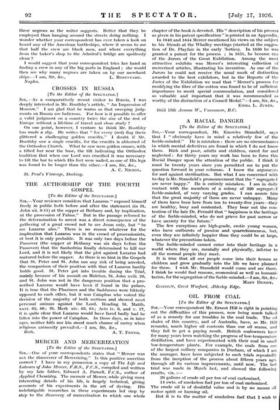A RACIAL DANGER
[To the Editor of the SPECTATOR.] Sin,—Your correspondent, Mr. Knowles Stansfield, says that I " obviously have in mind a relatively few of the feeble-minded." He is mistaken : there are no circumstances in which mental defectives are found in which I do not know them. Rich and poor, adults and children, cared for and neglected : for thirty years my work has been to force this Racial Danger upon the attention of the public. I think it must be twenty years since you permitted me to put the question forward in your columns. I know the arguments for and against sterilization. But what I am concerned with to-day is Mr. Stansfield's pronouncement that the " segregated are never happy." He is entirely mistaken. I am in daily contact with the members of a colony of 320 segregated feeble-minded, of very varying grades. I can assure him that the great majority of them are never unhappy. Many of them have been here from ten to twenty-five years—they are healthy, busy and contented. They bear out the con- tention of the late Dr. Fernald that " happiness is the heritage of the feeble-minded, who do not grieve for past sorrow or have anxiety for the future."
The few exceptions are high-grade, erotic young women, who have outbursts of passion and quarrelsomeness, but, even they are infinitely happier than they could be at large, whatever the precautions taken.
The feeble-minded cannot enter into their heritage in a world where they are, mentally and physically, inferior to all the normal people they meet.
It is true that all our people come into their homes as children and grow gradually into the life we have planned for them. I wish Mr. Stansfield would come and see them. I think he would find reasons, economical as well as humani- tarian, for the segregation of the feeble-minded.—I am, Sir, &c.,
Greencote, Great Warford, Alderley Edge.
MARY DENDY.










































 Previous page
Previous page